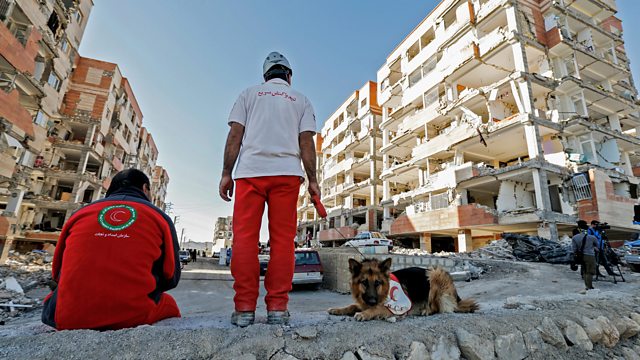
Predicting Earthquakes
Predicting earthquakes; Sex and cardiac arrest; pureLifi; Influenza; Techno into space for aliens to decode; Jaron Lanier; Fake human waste
In a week the border of Iran and Iraq saw a devastating earthquake, we are looking at predicting quakes and new research which says natural variations in the length of the day may influence the likelihood of strong earthquakes happening. Seismologist Roger Bilham and his colleague Rebecca Bendick from the University of Colorado Boulder explain their findings.
Every day in the USA more than a thousand people have a cardiac arrest. Some people with heart problems worry about whether the exertion of having sex might put a strain on their heart. But at the American Heart Association’s conference this week, there was good news: it is much rarer than we thought. Claudia Hammond talks to Sumeet Chugh of the Cedars-Sinai Heart Institute about his study.
LiFi is a wireless optical networking technology that uses light-emitting diodes (LEDs) for data transmission. Roland Pease reports on the latest product by company pureLifi. It wants to open up thousands more additional channels for wireless communications through LiFi.
Following the biggest ever influenza outbreak in Australia, it is now the turn of the northern hemisphere to prepare for the flu season. As winter approaches in Europe and the US we answer listeners’ questions on flu and colds. Katy Takatsuki reports.
Astronomers are beaming techno into space for aliens to decode. Scientists have asked artists including Nina Kraviz, Kate Tempest and Jean Michel Jarre to produce tracks which are being sent to a planet more than 70 trillion miles away from Earth. Studio guest Jason Palmer from The Economist explains.
Dawn of the New Everything by Jaron Lanier is a history and exploration of virtual reality, the term that he coined for the pioneering technology that he was instrumental in creating. The book is a hybrid of memoir and philosophy and gives a compelling account of the origins and development of the digital revolution. Lanier joins Gareth Mitchell to discuss his journey through virtual reality.
Roland Pease rolls his sleeves up and delves into the world of fake human waste. He meets researcher Naomi Deering at the University of Bath, who is making it her mission to help tackle poor hygiene by creating piles of fake poo, as part of a project to try and help reduce the 750,000 child deaths from poor sanitation.
(Photo caption: An Iranian civil defence K-9 unit wait near damaged buildings during a search for survivors in the town of Sarpol-e Zahab in the western Kermanshah province near the border with Iraq © Atta Kenare/AFP/Getty Images)
The Science Hour was presented by Gareth Mitchell with comments from science journalist and editor at the Economist Jason Palmer
Producer: Katy Takatsuki
Last on
More episodes
Previous
Broadcast
- Sat 18 Nov 2017 12:06GMT���˿��� World Service Americas and the Caribbean
Podcast
-
![]()
Unexpected Elements
The news you know, the science you don't

